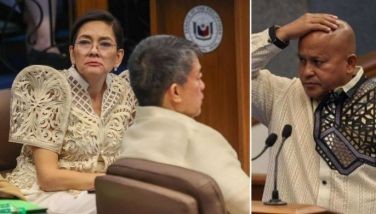China shows limits of 'adhocracy'

Our current diplomatic skirmishes with China have shown the limits of our government’s ad hoc approach to governance. The inadequacy of our foreign service and our military can no longer be ignored in the light of our recent experiences with China.
Money or the lack of it has been pointed to as the reason why our armed forces can’t get respect in the West Philippine Sea. Even if we diverted our entire national budget to “modernize” our armed forces, we still wouldn’t look respectable in a regional conflict, specially one with an emerging super power like China.
I am sure an arms race with China is out of the question even if we had the wherewithal to do that. No one wins a war, specially with current weapons of mass destruction.
I realize there are a lot of hot heads here and in China who can’t wait for a real world version of their video games. It is the role of responsible leaders to make sure all these verbal war mongering won’t get hot enough so that a trigger happy soldier or even civilian can start a shooting war.
This is where our diplomats come in. Our foreign service is supposed to be the cream of our bureaucracy… the best in terms of selection, training and professionalism. Speaking of the Foreign Service officers I have encountered while covering DFA during the Carlos Romulo years, I can attest to the fact that they are the most impressive government workers at that time.
I want to believe that the current crop is still the best but I am no longer sure. To some extent, it is not their fault. Our needs changed over the years. Diplomacy then involved relations among nations mostly on the political and economic levels… classical diplomacy so to speak.
Today, because of our unfortunate domestic economic situation, our diplomats are more concerned with bailing out our overseas workers. While this is an important concern and function, it may have contributed to a decreased emphasis on traditional diplomatic skills in our foreign service. As one ambassador once told me, he feels he is conducting a barangay meeting every day at the embassy.
When I was covering them in the early ’70s, we had diplomats who could navigate the tricky waters of Southeast Asian politics where countries do not like each other. Those were the days when Indonesia had a crush Malaysia campaign and we had problems with Malaysia too over Sabah yet managed to give life to ASEAN.
This China thing caught the DFA napping. China had been a rising star for so many years now but we didn’t develop the Foreign Service officers who can deal with China. Proof of this vacuum was the failure of the DFA to give P-Noy an acceptable alternative to Domingo Lee. The first two career officers recommended by Secretary Albert del Rosario had little or no China experience and didn’t speak Mandarin.
They had to recall a retired former ambassador to China to satisfy P-Noy’s valid criteria for an experienced envoy to Beijing. But even this one didn’t speak Mandarin and of frail health. Aside from language proficiency, we need China specialists who are highly conversant on the political, military and social developments in China. Otherwise, how can we devise an intelligent strategy of diplomatically dealing with China?
And on ASEAN, we used to have very experienced diplomats specializing in ASEAN. Ambassador Rod Severino and Rosario Manalo come to mind. The stalemate with Cambodia shouldn’t have been such a surprise. We should have worked behind the scenes for a Plan B that delivers the message but acceptable to a China lackey like Cambodia.
We shouldn’t have insisted in bringing that issue on our dispute with China before the ASEAN Foreign Ministers meeting unless we were sure we had the votes. It serves no purpose to be publicly repudiated as we were. It only gives China more confidence to bully us because they now know we don’t have our regional allies on our side. Secretary del Rosario seriously miscalculated.
As for the military, there was this story in The Tribune that blamed “the expanded role of soldiers to civilian functions” as something that has diminished the capability of the Armed Forces of the Philippines (AFP) as a war-fighting organization. The story was based on a paper recently published in the journal “The Air Force Way 2012”.
According to that paper, the over exposure of soldiers’ to civilian functions is contributing to the problems affecting professionalism in the military. “Although officially, support to civilian agencies is secondary to the core function of war-fighting, in reality, much of the time and activities that should have been devoted to combat training and preparation are being used to fulfill these tasks,” the article noted.
The AFP’s internal peace and security plan (IPSP) “Bayanihan,” designed to defeat insurgency by 2016, calls for more civil military operations (CMO) and development projects and less combat operations. So the military are now more into the construction of school buildings, roads and bridges, medical and dental missions and soldiers acting as teachers.
“Critical combat capabilities have been lost or transformed into capabilities that are oriented toward supporting civilians, not soldiers,” the PAF article said. “For example, the AFP at present does not have a combat engineering capability while it has several (civil) engineering brigades. Such diversion of missions and capabilities had given rise to a situation wherein people in the military no longer consider themselves as warriors,” it added.
The article also lamented the seeming lack of interest in military theory and history within the AFP, especially in most of its educational institutions. There is a scarcity of studies on such subjects even in General Staff Course (GSC) being offered by the AFP. The COA also recently chided the National Defense College for failing in its mission, as it now has more civilian students taking its Masters in National Security Administration course than soldiers.
Exigencies forced past and present administrations to reorient both the DFA and the AFP from their core missions. Those exigencies are supposed to be temporary but lingered on and on.
Sending our workers abroad for jobs was supposed to be a temporary response to local joblessness as we build up our economy. But from the time Marcos sent the first OFW abroad to now, our economy only became more dependent than ever on their remittances.
Remittances in the first five months of 2012 have reached $9.3 billion. So, the DFA must be reoriented to take care of OFW needs abroad. Given the sheer number of them specially in the Middle East and Europe, our diplomats can do very little else. The lesson of the Flor Contemplacion case is a constant nightmare for our diplomats.
As for the re-orientation of the military to perform civilian functions, that’s because we have a limited budget. In the absence of a potential external aggressor for many years, the military might as well make themselves useful elsewhere.
Indeed, we have practically disbanded the AFP through years of neglect as evidenced by their lack of equipment. We can’t blame the guys at the Air Force for feeling bad because they don’t have a single aircraft that can monitor our seas, much less intercept intruders.
This current conflict with China should make us rethink our priorities and our options. For the DFA, they need to develop China experts among the ranks of the career officers. That includes knowledge about what makes China tick and a good Mandarin speaking ability.
For the Armed Forces, we need to think in terms of a minimum defense capability. It is alright to have the soldiers do civic work now and then but they still need to train officers who can think in geo-political terms. Military strategy these days is quite different from what is still being taught at the Philippine Military Academy.
Today’s officers should be experts in political science, sociology as well as the latest in digital technology. We need officers in the mold of the late Alejandro Melchor. We need officers trained in strategic thinking. What we don’t need is someone like Defense Secretary Voltaire Gazmin who thinks in terms of running to Uncle Sam as our response to the China challenge.
The days of our ad hoc approach to diplomacy and the military are over… China saw to that. Dealing with China requires an intelligent response. Ranting and raving about China’s bullying is simply pathetic… even embarrassing. We can and should do better.
Bureaucracy
Some rules when dealing with the bureaucracy:
Rule #1: “Nothing Simple is Ever Easy”
Rule #2: “It’s about the money; follow the money.”
Rule #3: “Never ascribe to malice that which is adequately explained by stupidity.
Boo Chanco’s e-mail address is bchanco@gmail.com. Follow him on Twitter @boochanco
- Latest
- Trending
































